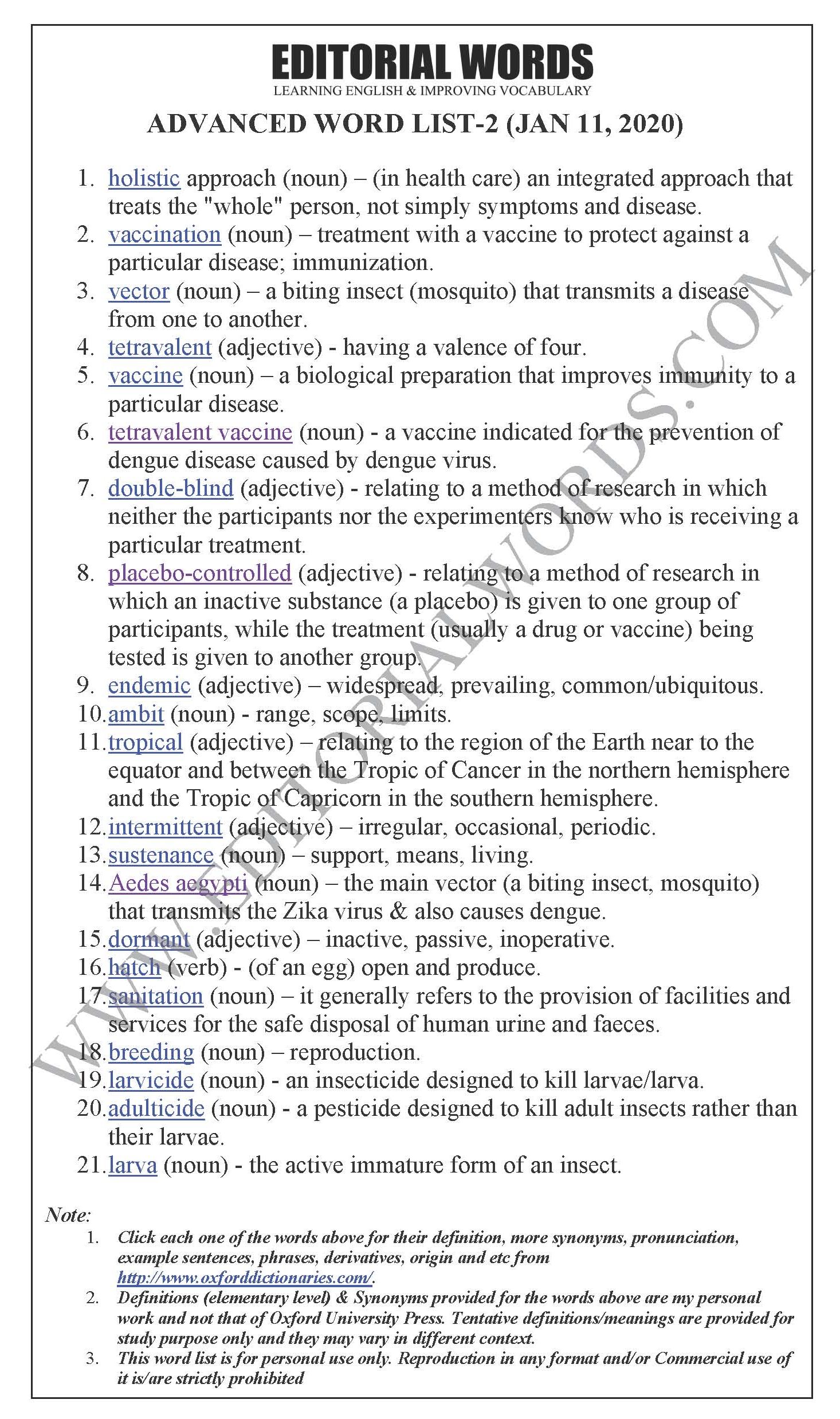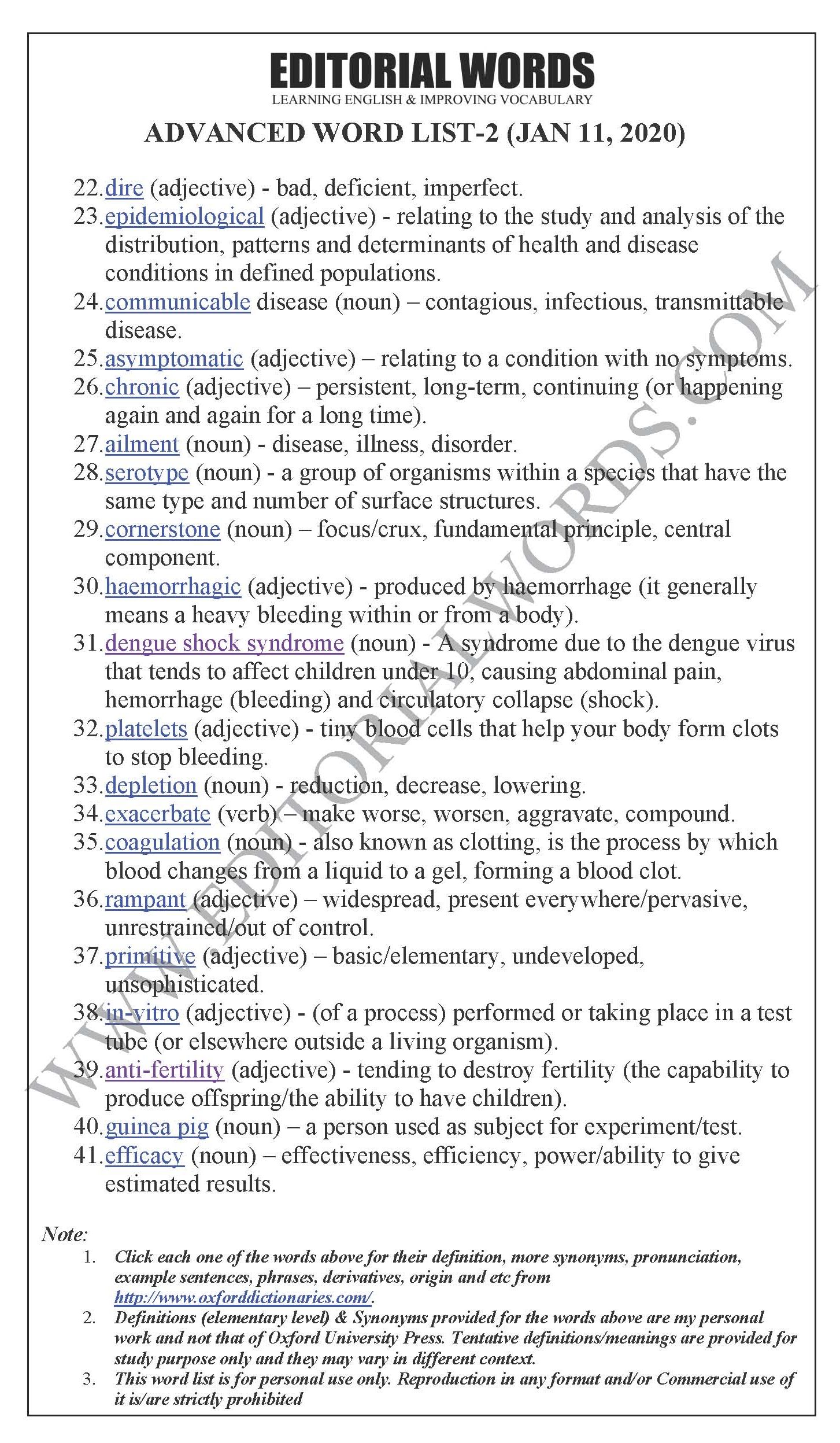The Hindu Opinion Article (Taking a holistic approach to dengue) – Jan 11, 2020
The advent of a new tetravalent vaccine against the dengue virus has thrown new light into the evidence-based management of dengue. For further reading, visit “The Hindu”. Below is today’s word list-2 for The Hindu Opinion Article (Taking a holistic approach to dengue) – Jan 11, 2020.
To read this article, click here.
This preview is provided here with permission.
Courtesy: The Hindu
Today’s Advanced Word List 2 For The Hindu Opinion Article (Taking a holistic approach to dengue) – Jan 11, 2020:
- holistic approach (noun) – (in health care) an integrated approach that treats the “whole” person, not simply symptoms and disease.
- vaccination (noun) – treatment with a vaccine to protect against a particular disease; immunization.
- vector (noun) – a biting insect (mosquito) that transmits a disease from one to another.
- tetravalent (adjective) – having a valence of four.
- vaccine (noun) – a biological preparation that improves immunity to a particular disease.
- tetravalent vaccine (noun) – a vaccine indicated for the prevention of dengue disease caused by dengue virus.
- double-blind (adjective) – relating to a method of research in which neither the participants nor the experimenters know who is receiving a particular treatment.
- placebo-controlled (adjective) – relating to a method of research in which an inactive substance (a placebo) is given to one group of participants, while the treatment (usually a drug or vaccine) being tested is given to another group.
- endemic (adjective) – widespread, prevailing, common/ubiquitous.
- ambit (noun) – range, scope, limits.
- tropical (adjective) – relating to the region of the Earth near to the equator and between the Tropic of Cancer in the northern hemisphere and the Tropic of Capricorn in the southern hemisphere.
- intermittent (adjective) – irregular, occasional, periodic.
- sustenance (noun) – support, means, living.
- Aedes aegypti (noun) – the main vector (a biting insect, mosquito) that transmits the Zika virus & also causes dengue.
- dormant (adjective) – inactive, passive, inoperative.
- hatch (verb) – (of an egg) open and produce.
- sanitation (noun) – it generally refers to the provision of facilities and services for the safe disposal of human urine and faeces (Courtesy: WHO).
- breeding (noun) – reproduction.
- larvicide (noun) – an insecticide designed to kill larvae/larva.
- adulticide (noun) – a pesticide designed to kill adult insects rather than their larvae.
- larva (noun) – the active immature form of an insect.
- dire (adjective) – bad, deficient, imperfect.
- epidemiological (adjective) – relating to the study and analysis of the distribution, patterns and determinants of health and disease conditions in defined populations.
- communicable disease (noun) – contagious, infectious, transmittable disease.
- asymptomatic (adjective) – relating to a condition with no symptoms.
- chronic (adjective) – persistent, long-term, continuing (or happening again and again for a long time).
- ailment (noun) – disease, illness, disorder.
- serotype (noun) – a group of organisms within a species that have the same type and number of surface structures.
- cornerstone (noun) – focus/crux, fundamental principle, central component.
- haemorrhagic (adjective) – produced by haemorrhage (it generally means a heavy bleeding within or from a body).
- dengue shock syndrome (noun) – A syndrome due to the dengue virus that tends to affect children under 10, causing abdominal pain, hemorrhage (bleeding) and circulatory collapse (shock).
- platelets (adjective) – tiny blood cells that help your body form clots to stop bleeding.
- depletion (noun) – reduction, decrease, lowering.
- exacerbate (verb) – make worse, worsen, aggravate, compound.
- coagulation (noun) – also known as clotting, is the process by which blood changes from a liquid to a gel, forming a blood clot.
- rampant (adjective) – widespread, present everywhere/pervasive, unrestrained/out of control.
- primitive (adjective) – basic/elementary, undeveloped, unsophisticated.
- in-vitro (adjective) – (of a process) performed or taking place in a test tube (or elsewhere outside a living organism).
- anti-fertility (adjective) – tending to destroy fertility (the capability to produce offspring/the ability to have children).
- guinea pig (noun) – a person used as subject for experiment/test.
- efficacy (noun) – effectiveness, efficiency, power/ability to give estimated results.
Today’s Advanced Word List 2 For The Hindu Opinion Article (Taking a holistic approach to dengue) – Jan 11, 2020:


Note:
-
Click each one of the words above for their definition, more synonyms, pronunciation, example sentences, phrases, derivatives, origin and etc from http://www.oxforddictionaries.com/.
-
Definitions (elementary level) & Synonyms provided for the words above are my personal work and not that of Oxford University Press. Tentative definitions/meanings are provided for study purpose only and they may vary in different context.
-
This word list is for personal use only. Reproduction in any format and/or Commercial use of it is/are strictly prohibited.
“Phrasal Verbs” We Learnt Last Week

Be the first to comment